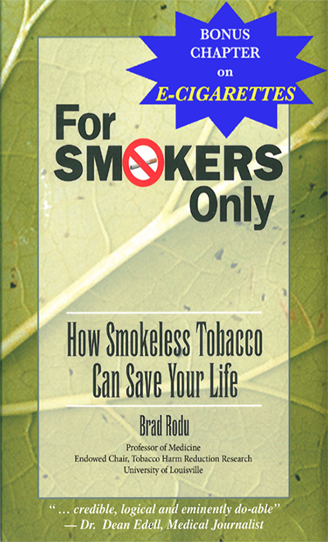When Congress gave the FDA regulatory authority over tobacco in 2009, it directed the agency to evaluate dissolvable smokeless tobacco. This week the FDA Tobacco Product Scientific Advisory Committee is holding hearings, and this has prompted a media blitz by anti-tobacco extremists.
Thomas J. Glynn, the director of science and trends for the American Cancer Society, issued a strange statement (here): “At this point, we don't know the full range of what is in them.”
Dr. Glynn may not be aware that dissolvable tobacco has been analyzed extensively (discussed here), and we do know what is in them: tobacco, flavors, non-caloric sweeteners and a few food-grade additives.
Two months ago Dr. Glynn authored an “Expert Voices” blog post titled “Here Come the Dissolvables” (here), in which he included some reasonable comments about dissolvable tobacco and one demonstrably false statement. ACS describes the blog as providing “timely insight on cancer topics from experts.” I have previously discussed other statements from Dr. Glynn (here).
ACS, at last, acknowledged that smokeless tobacco use is less hazardous than smoking. Dr. Glynn: “Certainly, as with all smokeless tobacco products, [dissolvable tobacco] will be less lethal than smoked cigarettes…” He added that “smokers should certainly continue to be made aware of that.”
A few paragraphs later, Dr. Glynn repeated the smokeless-is-safer theme: “…there is little doubt that, if all smokers in the U.S. suddenly switched from smoked cigarettes to smokeless tobacco – and stayed switched – we would see far fewer cancers and less heart disease 20 years from now…” He again noted, “smokers should continue to be made aware of the reduced, but by no means empty, threat posed by smokeless tobacco…”
Unfortunately, Dr. Glynn didn’t acknowledge ACS’s refusal to educate smokers about vastly safer smokeless tobacco, or the organization’s refusal to release critical information about the relative safety of smokeless tobacco (here).
Dr. Glynn made a passing reference to my research when he said, “Some proponents of smokeless tobacco, including dissolvables, make the argument that smokeless tobacco is as much as 98% less harmful than smoked cigarettes.” Later he opined that the “‘98% less harmful’ figure is suspect,” though he provides no evidence to support his suspicion.
Glynn’s core position remained prohibitionist. “It would be irresponsible,” he wrote, “for the public health community to urge [smokers to switch to smokeless tobacco] because there is also no evidence that smokers won’t just end up using both forms of tobacco, rather than using only smokeless – or better yet, quitting altogether.”
It is disappointing that Dr. Glynn repeatedly disrespected smokeless users by using the term “spit tobacco”. I previously reported this inappropriate and unprofessional practice to the ACS president (here), and I had been told that it had been discontinued.
Dr. Glynn made a demonstrably false statement when he predicted that “…if all smokers in the U.S. suddenly switched from smoked cigarettes to smokeless tobacco – and stayed switched…we would also see an increased number of oral cancers…”
The risk for oral cancer among smokeless tobacco users is much lower than the risk among smokers. In fact, since 1990, no epidemiologic study has reported any significantly elevated risk among smokeless users.
It is almost certain that a large-scale permanent switch from cigarettes to smokeless tobacco would not only result in a significant reduction in the number of oral cancers, it would substantially reduce all smoking-related diseases.
Subscribe to:
Post Comments (Atom)











No comments:
Post a Comment